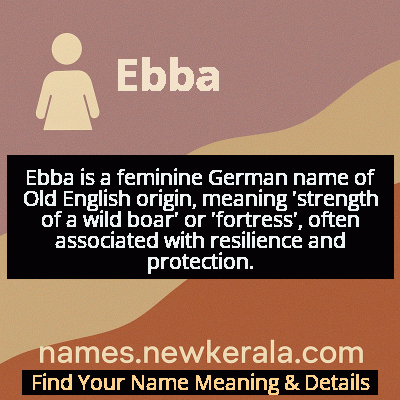Ebba Name Meaning & Details
Origin, Popularity, Numerology Analysis & Name Meaning of Ebba
Discover the origin, meaning, and cultural significance of the name EBBA. Delve into its historical roots and explore the lasting impact it has had on communities and traditions.
Name
Ebba
Gender
Female
Origin
German
Lucky Number
1
Meaning of the Name - Ebba
Ebba is a feminine German name of Old English origin, meaning 'strength of a wild boar' or 'fortress', often associated with resilience and protection.
Ebba - Complete Numerology Analysis
Your Numerology Number
Based on Pythagorean Numerology System
Ruling Planet
Sun
Positive Nature
Leaders, ambitious, highly driven, self-reliant, innovative.
Negative Traits
Overly aggressive, domineering, impatient, selfish.
Lucky Colours
Red, orange, gold.
Lucky Days
Sunday.
Lucky Stones
Ruby, garnet.
Harmony Numbers
2, 3, 9.
Best Suited Professions
Entrepreneurs, managers, engineers.
What People Like About You
Courage, determination, leadership.
Famous People Named Ebba
Saint Ebba of Coldingham
Religious Figure
Founded monasteries in Scotland and was known for her piety and leadership
Ebba Busch
Politician
Leader of the Swedish Christian Democrats and Deputy Prime Minister of Sweden
Ebba von Sydow
Journalist/Author
Renowned Swedish journalist and bestselling author on parenting and family life
Ebba Jungmark
Athlete
Swedish high jumper who won silver at the 2012 European Championships
Name Variations & International Equivalents
Click on blue names to explore their detailed meanings. Gray names with will be available soon.
Cultural & Historical Significance
In Scandinavian contexts, particularly Sweden, Ebba has maintained continuous usage since the medieval period, often appearing in royal and noble families. The name's endurance through various historical epochs—from the Viking Age to modern times—demonstrates its cultural adaptability and timeless appeal. During the 19th century national romantic movements in Scandinavia, names like Ebba gained renewed popularity as symbols of cultural heritage. Today, the name represents a bridge between ancient Germanic traditions and contemporary Nordic identity, embodying both historical depth and modern sophistication. Its consistent presence in Scandinavian name registers for over a millennium makes it one of the region's most culturally resilient female names.
Extended Personality Analysis
Individuals bearing the name Ebba are typically characterized by a remarkable combination of inner strength and compassionate intelligence. The name's etymological roots in the wild boar symbolism suggest core traits of resilience, determination, and protective instincts. Ebbas often display natural leadership qualities, approaching challenges with strategic thinking and unwavering commitment. They tend to be practical problem-solvers who value honesty and direct communication, sometimes appearing reserved initially but revealing deep loyalty to those they trust. Their strength is not merely physical or assertive but manifests as emotional fortitude and moral courage.
Beyond their evident strength, Ebbas frequently possess keen emotional intelligence and artistic sensitivity. Many demonstrate creative talents or strong aesthetic appreciation, balancing their practical nature with imaginative thinking. In relationships, they are known for their reliability and deep capacity for caring, though they maintain clear personal boundaries. The historical association with Saint Ebba adds dimensions of spiritual depth and community orientation, suggesting that modern Ebbas often feel drawn to meaningful work that serves others. Their personality represents a harmonious blend of traditional Germanic virtues—courage, loyalty, perseverance—with contemporary values of empathy, equality, and self-expression. This makes Ebbas particularly adept at navigating complex social and professional environments while maintaining their authentic character.
Modern Usage & Popularity
In contemporary naming practices, Ebba has emerged as a stylish choice that balances historical significance with modern appeal. The name has seen significant resurgence in Scandinavia, particularly in Sweden where it consistently ranks within the top 50 girls' names since the early 2000s. This revival reflects broader trends favoring short, strong names with Nordic heritage. Beyond Scandinavia, Ebba has gained traction in Germany, the United Kingdom, and North America among parents seeking distinctive yet accessible international names. The name's popularity has been bolstered by several factors: the global influence of Scandinavian design and culture, the trend toward gender-neutral naming (though Ebba remains predominantly feminine), and celebrity usage including Swedish celebrities choosing the name for their children. Social media platforms and international mobility have further disseminated the name's appeal, making it recognizable while maintaining its unique character. Demographic data shows Ebba is particularly popular among educated, urban families who value cultural authenticity and strong meanings in name selection. Its brevity (four letters, two syllables) makes it compatible with various surnames and middle names, contributing to its cross-cultural adaptability.
Symbolic & Spiritual Meanings
The symbolic resonance of Ebba extends far beyond its literal meaning, embodying multifaceted concepts of strength, transformation, and cultural continuity. Primarily, it symbolizes protective strength derived from its wild boar etymology—representing not just physical power but the courage to defend values, loved ones, and principles. This makes Ebba emblematic of guardianship in both personal and community contexts. The name also carries strong symbolism of leadership and foundation-building, inspired by Saint Ebba's historical role in establishing religious communities that became centers of learning and culture. In psychological terms, Ebba represents the integration of strength and sensitivity—the ability to be both resilient and compassionate.
Metaphorically, Ebba symbolizes the enduring power of cultural heritage in modern identity. As a name that has survived over thirteen centuries while adapting to different historical contexts, it represents the successful fusion of tradition and progress. The phonetic qualities of the name—beginning with the strong 'Eb' sound and concluding with the soft 'a'—symbolize the balance between determination and grace. In literary and artistic interpretations, Ebba often represents characters who undergo significant personal transformation while maintaining core integrity. The name's association with water (through similar-sounding words like 'ebb') adds layers of symbolism related to natural rhythms, emotional depth, and the cyclical nature of strength—sometimes receding, always returning with renewed force.

